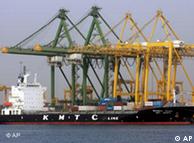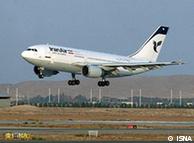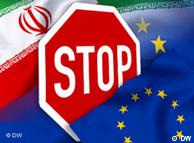IRAN | 24.08.2010
US and EU struggle to make Iran sanctions watertight
The focus on shipping is being closely coordinated with the European Union and US Treasury officials say the emphasis on shipping compliments their earlier focus on Iran's banking and energy sectors that forced European banks accused of violating the sanctions regime, including Credit Suisse and Lloyd's, to pay hefty fines.
Barclay's Bank recently agreed to pay $298 million (236 million euros) in penalties for hiding transactions with banks in Iran and other countries sanctioned or embargoed by the US.
"Commerce with Iran requires extraordinary vigilance. Iran has used channels of legitimate commerce, by which I mean banking, shipping, transshipment. They have used all these facially legitimate methods to facilitate illicit conduct," said the treasury's undersecretary for terrorism and financial intelligence, Stuart Levey, at the beginning of a Middle East tour to ensure adherence to the sanctions by key Iranian trading partners, foremost among them the United Arab Emirates.
Brothers in arms
The treasury officials say the Islamic Republic of Iran Shipping Lines (IRISL), Iran's national shipper, which owns the Maltese companies - Marble Shipping Limited, Bushehr Shipping Company and ISI Maritime Limited -, is a prime carrier of cargoes related to Iran's missile and other military programs as well as of arms shipments to Hezbollah, the Lebanese militia-cum-political party designated by the US and some European countries as terrorist.
The treasury designated IRISL in 2008, but is now seeking to ensure that its sanctions are effective and prevent the company from circumventing restrictions by renaming and reflagging its vessels or chartering third-party ships. The renewed focus is also designed to make it more difficult for IRISL to obtain insurance and services.
In line with the US effort, the EU last month expanded its restrictions on shipping to Iran to include all shipping companies and vessels as well as air transport rather than only IRISL or other Iranian shippers and vessels.
Prosecutors in the southwestern German city of Karlsruhe this month charged a German and an Iranian national with violating the arms embargo and the EU's export ban on dual-use equipment by shipping to Iran a vacuum sintering furnace in July 2007 worth 850,000 euros ($1.1 million). The prosecutors charge that the furnace needed to construct parts for a missile's guidance system and warheads, falls under the embargo because long-range missiles could carry weapons of mass destruction in their payload.
Britain's Lord Chancellor Ken Clarke is investigating claims made by a BBC documentary and The New York Times that Isle of Man shipping companies set up as shells by IRISL are busting sanctions by shipping arms to Iran. The Isle of Man government has denied the allegations. The BBC documentary said Israeli navy commandos seized a cache of arms off the coast of Cyprus last November. The weapons were packed in crates marked IRISL on an Isle of Man-registered vessel, the Visea, that had set sail from Iran to Egypt, the BBC said.
UAE emerges as dangerous cargoes hub
 The port of Dubai is seen as a major hub for shipments to Iran
The port of Dubai is seen as a major hub for shipments to Iran
Levey warned that "some of Iran's most dangerous cargo continues to come and go from Iran's ports, so we must redouble our vigilance over both their domestic shipping lines, and attempts to use third-country shippers and freight forwarders for illicit cargo."
Levey's concern is particularly true for freewheeling Dubai and Ras al Khaimah (RAK), the two UAE emirates that operate as major Iranian transshipment nodes. Iran does $12 billion-a-year worth of trade with the UAE, on which it relies for the import of goods, many of which fall under UN or US sanctions.
The UAE recently restricted Iranian use of Dubai's port and its central bank froze accounts of 40 entities and an individual blacklisted by the UN for assisting Iran's nuclear and missile programs. Ras al Khaimah's free zone, home to some 200 Iranian firms, has stopped issuing licenses to new Iranian companies, according to the zone's CEO, Oussama el Omari.
"RAK was looking to offer benefits to attract Iranian companies in the past. Now perhaps it's not in their favor to do so due to sanctions so they have changed their viewpoint," said Morteza Masoumzadeh, the head of the Iranian Business Council in Dubai.
The UAE's apparent renewed commitment to the sanctions regime follows the disclosure via satellite imagery of Iranian military installations on Abu Musa, the largest of three islands at the entrance of the Strait of Hormuz occupied by Iran. The installations included three missile launch pads, an elaborate underground market, and a sports field with the words "Persian Gulf" emblazoned on it - a provocative reminder of Iran's hegemonic view of a region the Gulf states describe as the Arab Gulf.
UAE Foreign Minister Sheikh Abdullah Bin Zayed Al Nahayan recently stopped short of comparing Iran's occupation of the islands to Israel's occupation of Palestinian territory. "Iran refuses to allow us to send teachers, doctors and nurses. I am not comparing Iran to Israel, but Iran should be more careful than others," Al Nahayan said.
Undermining sanctions
Ensuring that the sanctions against Iran are watertight is proving difficult despite the stepped up commitment from countries like the UAE. China, Russia, India and Turkey, in response to the latest US and EU sanctions, have moved to capitalize on investment opportunities. The four nations have reiterated their adherence to weaker sanctions imposed on Iran in June by the UN Security Council, but say they are not obliged to follow the recently announced more stringent US and EU rules.
In violation of petroleum-related deals with Iran, China and Turkey recently sold gasoline to Tehran while Russian officials say they will ship gasoline by the end of this month. The four countries are also signing deals to invest billions of dollars in Iran's oil and gas fields, petrochemical plants and pipelines. "Sanctions will not hinder us in our joint cooperation," Russian Energy Minister Sergei Shmatko said at the signing in July in Moscow of an energy partnership agreement with Iran.
 Western intelligence services allege that Iran is flying personnel and weapons to Latin AmericaIn his talks with Lebanese leaders, Levey, according to well-placed Lebanese sources, raised US and EU concerns about a mysterious twice-monthly Iran Air flight from Tehran to the Venezuelan capital of Caracas with intermediary stops in Damascus and Beirut.
Western intelligence services allege that Iran is flying personnel and weapons to Latin AmericaIn his talks with Lebanese leaders, Levey, according to well-placed Lebanese sources, raised US and EU concerns about a mysterious twice-monthly Iran Air flight from Tehran to the Venezuelan capital of Caracas with intermediary stops in Damascus and Beirut.
Current and former EU, US and Israeli intelligence officials assert that Iran Air flight 877 ferries people and weapons to Latin America in advance of possible retaliatory attacks against the US should the US or Israel strike at Iranian nuclear sites. They also say the flight may be ferrying back to Iran sanctioned items for Iran's military programs.
Although flight 877 is publicly announced, would-be travelers seeking a reservation are invariably told by Iran Air that no seats are available, Western intelligence sources say.
Former CIA Direct Michael J. Hayden concedes that Western intelligence services are unable to substantially monitor the flights or understand their precise purpose. Hayden says the flights are a concern because they constitute a direct and uncontrolled Iranian link into the Western Hemisphere.
"I can tell you that we're really interested in that direct flight… It is something that we are sensitive to," Hayden said. The State Department declined comment on the flight, saying in a statement that "nations have the right to enter into cooperative relationships with other nations."
Author: James M. Dorsey
Editor: Rob Mudge


No comments:
Post a Comment